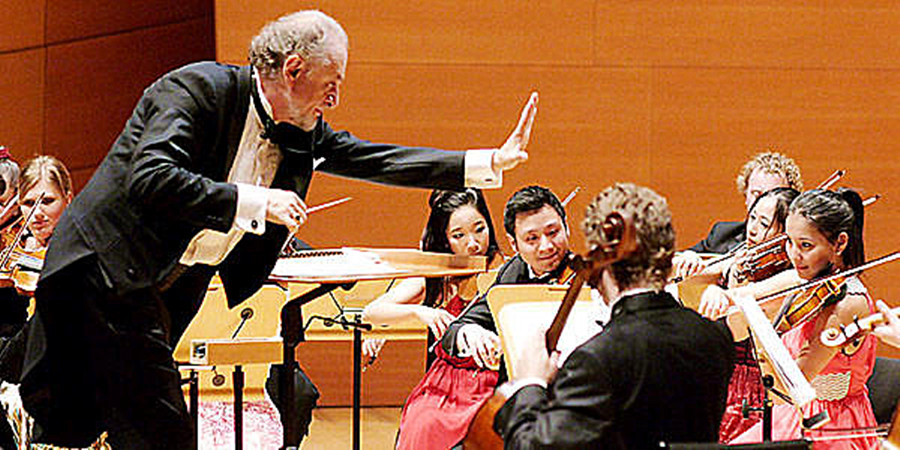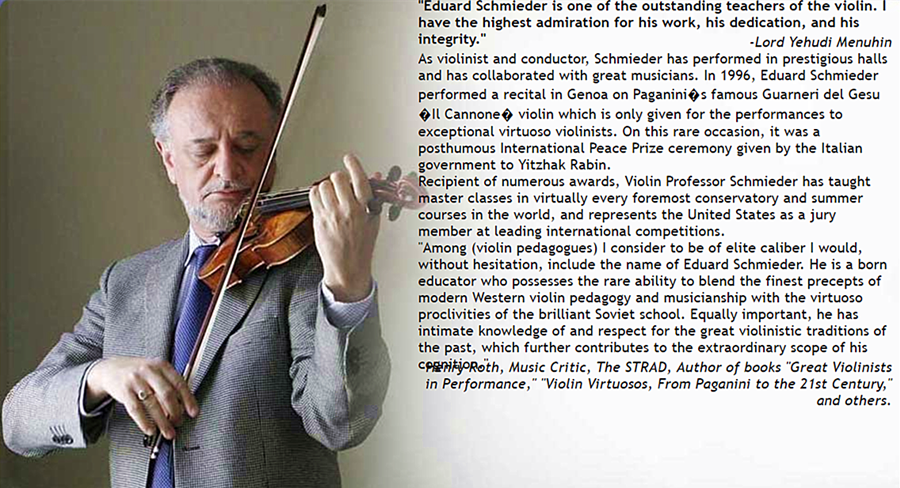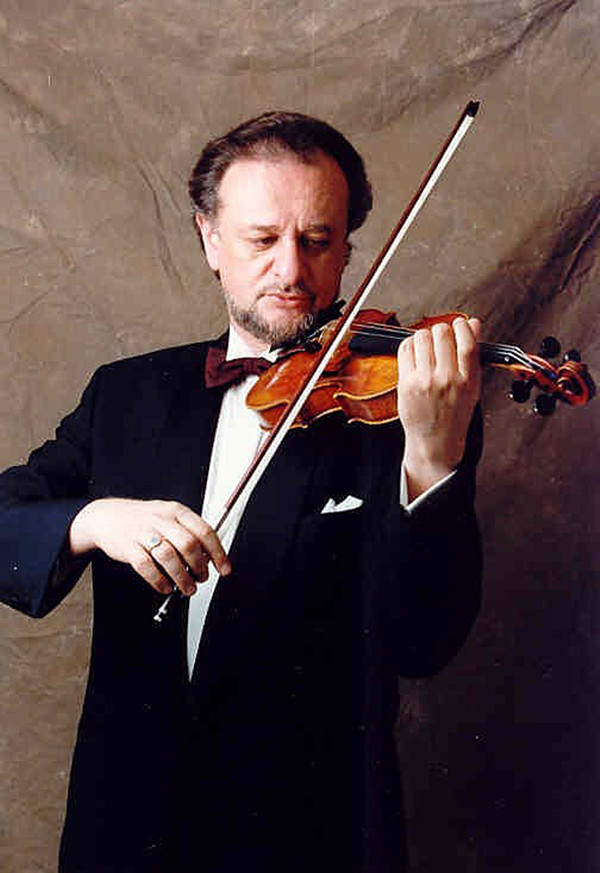|
||||||||||||||||||||||||||
.png) |
 |
|||||||||||||||||||||||||
|
|

|
||||||||||||||||||||||||||||||
|
|
|
|||||||||||||||||||||||||||||
| 爱德华,施密德 Eduard Schmieder(1948~) | ||||||||||||||||||||||||||||||
|
The Great Violinests |
||||||||||||||||||||||||||||||
|
Margaret Campbell |
||||||||||||||||||||||||||||||
|
《不朽的小提琴家》[英]玛格丽特·坎贝尔 |
||||||||||||||||||||||||||||||
|
Edward
Schmid was born in 1948 in Lviv, Ukraine, and his father was a surgeon.
Schmid began to study violin at the age of five, and at the age of seven
he played Bach's "A Minor Concerto" at the concert. Later he entered the
Mussorgsky Conservatory in Leningrad and studied with Mikhail Vierman.
At the age of sixteen, Schmidt represented the Soviet Union in the
Paganini competition in Genoa, but due to a sudden heart attack, Schmidt
missed the game. Subsequently, Schmid was sent to Piarnu on the Baltic
coast to recuperate, all famous Soviet musicians have their own villas
here. During the period of cultivation, the local concert hall allowed
Schmid to practice in it. One day, when he had just finished playing the
first movement of the Tchaikovsky Violin Concerto, he heard loud
applause. Schmidt was surprised to find David. · Oistrach is sitting in
the seat. When the great musician told him that he wanted to teach him,
Schmid was flattered. So in the next seven years, the annual summer of
Schmidt came to learn from Oistrach. In 1970, Schmidt entered the Gneissin Conservatory and studied with Felix Andreevsky. Two years later, Andreevsky immigrated to Israel, so Schmidt continued to study with Mikhail Galicsky and later became a teacher at the Gnesin Academy of Music, teaching violin methodology. His professor's content combines the performance, teaching and learning of a Ph.D. In 1980, Schmid decided to move the family to the United States. When he arrived in the United States, Schmid did not speak a word of English. Even when he got his first job in the United States at Lamar University in Beaumont, Texas, he knew nothing about English. When Schmid started working, there was only one student in the school who studied the violin, but in just two and a half years, he had twelve students in his class, and several of them won the competition. "I think if you come to teach students, you must know some terms - I also taught some foreign students in the Soviet Union - if your expression and expression are sufficiently expressive, the students will understand you. The meaning of the words. Later, the Dean of the Meadow School of Music at Rice University in Houston invited Schmid to teach, and Schmidt accepted it with pleasure. But in order not to leave his Lamar students, he taught at Lamey in the first year of teaching at the Meadow School of Music, often between the two places. His number of students is three times faster. Later, Schmid moved from Houston to Los Angeles and became a violin professor at the University of Southern California. This is where Hefitz once worked. In 1990, Schmid became a violin professor at the Meadow School of Music at the Southern Methodist University in Dallas, Texas. He is still the recipient of the honor of Alger's distinguished professor of violin and chamber music. Now Schmid is a visiting professor at the Paris Conservatory of Music and many other European conservatories. He is a regular judge and serves as a judge for the International Violin Competition, including the Paganini Violin Competition, the Sibelius Violin Competition and the Queen Elizabeth Competition. Schmid also often returned to the motherland of Russia, and was also welcomed and loved in the homeland. In 1996, Schmid received an honorary professorship from the Almaty Conservatory of Music in the Republic of Kazakhstan. - "The immortal violinist" [English] Margaret Campbell |
|
|||||||||||||||||||||||||||||
|
爱德华施密德于1948年出生在乌克兰的里维夫,父亲是一位外科医生。施密德五岁开始学习小提琴,七岁时在音乐会上演奏了巴赫《a小调协奏曲》。后来他进入列宁格勒的穆索尔斯基音乐学院跟随米哈伊尔·维埃曼学习。十六岁时,施密德代表苏联参加了在热那亚举行的帕格尼尼大赛,但是由于突发心脏病,施密德无缘比赛。随后,施密德被送往波罗的海岸的皮亚尔努休养,所有著名的苏联音乐家都在这里有自己的别墅。在修养期间,当地音乐厅允许施密德在里面练习,有一天当他刚刚结束柴可夫斯基小提琴协奏曲第一乐章的演奏时,就听到了响亮的掌声,施密德惊奇地发现大卫·奥伊斯特拉赫坐在座位上。当这位伟大的音乐家告诉他想给他上课时,施密德受宠若惊。所以在随后的七年间,每年的暑期施密德都来跟奥伊斯特拉赫学习。 1970年,施密德进入格涅辛音乐学院,跟随费利克斯·安德瑞夫斯基学习。两年后,安德瑞夫斯基移民以色列,于是施密德跟随米哈伊尔·加利茨基继续学习,后来成为格涅辛音乐学院的教师,教授小提琴方法论。他的教授内容结合了博士学位的演奏,教学以及学习。1980年施密德决定全家移居美国。当时到达美国时,施密德一句英语都不会说。甚至是在德克萨斯州博蒙都的拉马尔大学获得自己在美国的第一份工作时,他对英文也一窍不通。在施密德开始工作时,整所学校只有一个学生学习小提琴,但是在短短的两年半后,他的班上有了十二位学生,而且其中几位获得了比赛奖项。“我想如果你来教学生的话,你一定要知道一些术语——我在苏联的时候也教过一些外国的学生——如果你的神态和表情有足够的表现力的话,学生们会明白你的意思。”后来,位于休斯顿的赖斯大学的梅多音乐学院的院长邀请施密德前去任教,施密德欣然接受。但是为了不离开他的拉马尔的学生们,他第一年在梅多音乐学院任教的同时也在拉马尔任教,经常往返两地之间。他的学生数量很快就多了三倍。 后来,施密德从休斯顿搬到了洛杉矶,成为南加利福利亚大学的小提琴教授,这也是海菲茨曾经工作的地方。1990年,施密德成为德克萨斯达拉斯的南卫理工会大学梅多音乐学院的小提琴教授,到目前,他依然是阿尔古尔小提琴和室内乐杰出教授荣誉的获得者。现在施密德是巴黎音乐学院以及其它许多欧洲音乐学院的客座教授,经常举行大师班并担任国际小提琴大赛的评委,其中包括帕格尼尼小提琴大赛,西贝柳斯小提琴大赛以及伊丽莎白女王比赛。施密德也经常回到祖国俄罗斯,在故土也受到人们的欢迎和爱戴。1996年,施密德获得了哈萨克斯坦共和国阿拉木图音乐学院授予的杰出荣誉教授。 ——《不朽的小提琴家》[英]玛格丽特·坎贝尔 |
||||||||||||||||||||||||||||||
 |
||||||||||||||||||||||||||||||
| Eduard Schmieder is conducting the band 爱德华.施密德在指挥 | ||||||||||||||||||||||||||||||
|
“Among (violin pedagogues) I consider to be of elite caliber I would, without hesitation, include the name of Eduard Schmieder. He is a born educator who possesses the rare ability to blend the finest precepts of modern Western violin pedagogy and musicianship with the virtuoso proclivities of the brilliant Soviet school. Equally important, he has intimate knowledge of and respect for the great violinistic traditions of the past, which further contributes to the extraordinary scope of his cognition”–Henry Roth, Music Critic, The STRAD, Author of books “Great Violinists in Performance”, “Violin Virtuosos, From Paganini to the 21st Century”, and other. ““… He elicits great dynamic from the orchestra…altogether, all the participants are wide awake and in fact, honor and wait anxiously for the conductor’s wishes… predominant excitement brought out by Schmieder.” –Eberhard Iro, Review on Mahler Chamber Orchestra, Landshuter Rathausprunksaal “Eduard Schmieder is a distinguished musician… his coming in Bucharest was an inspiring one… connected musical life from here to the world standards…” — Fred Popovici, Romania Liberia “…conductor Eduard Schmieder elicited a lively pulse…the ensemble was particularly noteworthy for its unity of purpose and blend. It was as if the musicians’ hearts were beating to the same buoyant rhythm…lustrous, polished tone and graceful phrasing.” –Vivien Schweitzer, New York Times (2007) “..rich sonorities [of iPalpiti] audibly took the audience’s breath away – especially whenever concertmaster Peter Rainer, whose technically immaculate tone throughout the night was sweet and thrilling, had a few bars to play – showed that iPalpiti had charms to soothe a hall well filled –STRINGS Magazine (2005) “… a serious and resourceful podium personality.” –Daniel Cariaga, Los Angeles Times “… The virtues of Mr. Schmieder as a sensitive and true musician inspired the players to create a very deep and emotional interpretation which kind of magnetized all its sensual harmonies and well phrased performance. This was a concert which could be titled as ‘pearls of music” from any point.'” -– Ora Binur, Ma’ariv Jerusalem Daily. |
“我认为,在我认为具有精英才能的小提琴教育家中,他毫不犹豫地加入了爱德华·施米德的名字。他是一位天生的教育家,拥有将现代西方小提琴教育学和音乐学的最好规则与苏联卓越学派的精湛技艺结合在一起的罕见能力。同样重要的是,他对过去伟大的小提琴传统有着深入的了解和尊重,这进一步促进了他认知的非凡范围。“ - 亨利罗斯,音乐评论家,STRAD,书籍作者”伟大的小提琴演奏家“ “Violin Virtuosos,从帕格尼尼到21世纪”等
|
|||||||||||||||||||||||||||||
|
|
||||||||||||||||||||||||||||||
| Eduard Schmider and Ida haendel 施密德先生和艾达.韩德尔 | ||||||||||||||||||||||||||||||
 |
||||||||||||||||||||||||||||||
|
|
||||||||||||||||||||||||||||||
| 未得原作者编者授权严禁转载www.mt77.com任何内容 | ||||||||||||||||||||||||||||||
|
|
|
||||||
|
copyright © 2003-2005 xilu.com all rights reserved. |
||||||
|
|
||||||















